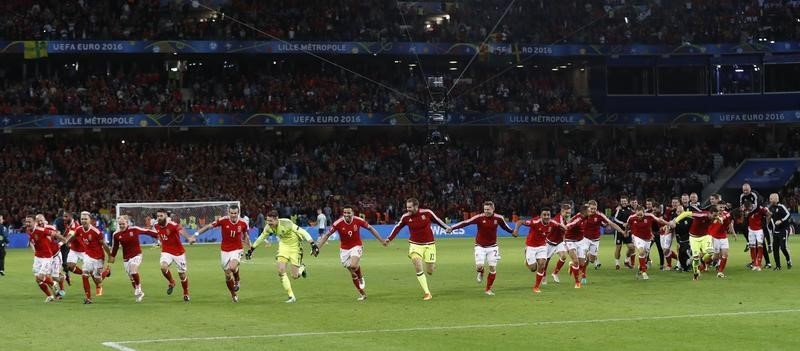By Alastair Macdonald
LILLE, France (Reuters) - Are Wales channelling the Brexit effect?
The national soccer team's progress to the Euro 2016 semi-final a week after the Welsh voted to leave the EU recalls an earlier upset by eurosceptic underdogs, immortalised in one of the snappiest one-liners in political and sporting history.
In June 1992, Danish voters delivered Brussels an earthquake on the scale of Britain's Brexit by vetoing the Maastricht Treaty that was going to create the much closer European Union.
Three weeks later, the unfancied Danes, playing in Euro92 in Sweden only because the disintegrating Yugoslavia had just been disqualified, beat the newly reunified Germany 2-0 in the final.
That very evening, Danish Foreign Minister Uffe Ellemann-Jensen flew in for a summit dinner in Lisbon to face the music for the referendum from a furious German Chancellor Helmut Kohl and the assembled leaders of the 12-nation European Community.
Turning to the cameras, a red and white supporters scarf on his shoulders, pipe in hand, a beaming Ellemann-Jensen said he knew he could secure more concessions before Denmark would join the new European Union: "We are going to win," he declared.
"Because, as we say, if you can't join them, beat them."
He did get a deal, and the next year Danes voted to back Maastricht. What will happen to Wales, which voted 53 percent to quit the EU - more than the UK as a whole - is another matter.
The Welsh outfoxed hot tips Belgium 3-1 in Lille, prompting former Finnish premier Alexander Stubb to offer congratulations on Twitter on Saturday and to recall Ellemann-Jensen's remark.

For now, Britain is in political chaos but rallying behind Chris Coleman's Wales, the only home nation still playing in Europe as they face Cristiano Ronaldo and Portugal on Wednesday.